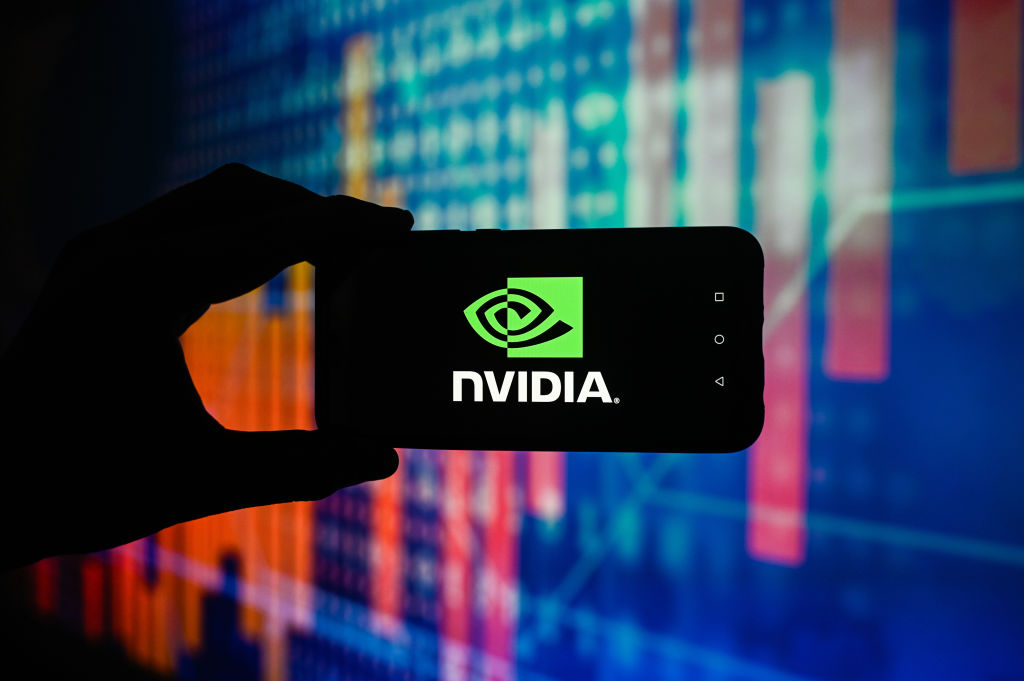Nvidia dethrones Microsoft to become world’s most valuable company - should you invest?
The chipmaker’s share price continues to soar, leaving all in its wake. What is behind Nvidia’s rise?


Get the latest financial news, insights and expert analysis from our award-winning MoneyWeek team, to help you understand what really matters when it comes to your finances.
You are now subscribed
Your newsletter sign-up was successful
Want to add more newsletters?

Twice daily
MoneyWeek
Get the latest financial news, insights and expert analysis from our award-winning MoneyWeek team, to help you understand what really matters when it comes to your finances.

Four times a week
Look After My Bills
Sign up to our free money-saving newsletter, filled with the latest news and expert advice to help you find the best tips and deals for managing your bills. Start saving today!
Nvidia has become the world’s most valuable company after the chipmaker's share price rose to an all-time high on Tuesday 18 June.
The Californian company, which started life in 1993 as a specialist provider of 3D graphics for computer games, overtook Microsoft on the back of its share price nearly doubling since the start of this year. In February, Nvidia became the fourth biggest company in the world.
A boom in artificial intelligence (AI), and billions of pounds worth of sales to the biggest tech companies, has seen Nvidia take the top spot ahead of Microsoft, Apple, Alphabet, which owns Google, and the state-owned oil giant Saudi Aramco.
MoneyWeek
Subscribe to MoneyWeek today and get your first six magazine issues absolutely FREE

Sign up to Money Morning
Don't miss the latest investment and personal finances news, market analysis, plus money-saving tips with our free twice-daily newsletter
Don't miss the latest investment and personal finances news, market analysis, plus money-saving tips with our free twice-daily newsletter
Christopher Rossbach, investment head at J Stern & Co, says: “We believe that AI and the metaverse will have a transformative impact on the global economy and on the companies driving innovation and growth.
“Nvidia has been our strongest position year-to-date and we continue to believe that it has extraordinary prospects for growth and value creation.”
Nvidia’s share price – what’s behind its meteoric rise?
Nvidia has easily been the best performing of the Magnificent Seven tech stocks in recent years. Over the past five years, it has grown by more than 3,000%.
Investors looking to profit from the rising tide of AI have been snapping up the stock, making it one of the most popular investments on DIY platforms. This, combined with a string of impressive results, has propelled its rise.
The company reported its most recent earnings on 22 May – and they were impressive. First-quarter revenue was $26 billion, up 18% from the previous quarter and up 262% compared to a year ago.
In addition to its chips, growth in the company’s data centre business has been driving its strong performance. Data centres made up 87% of overall revenues in the first quarter.
The company’s ascent is “remarkable”, says Russ Mould, investment director at AJ Bell, “particularly as it is now considered to be more valuable than one of the most lauded electronic device makers in the world”.
He adds: “There is a feeling that as long as Nvidia’s share price is rising, investors are happy and everything is fine on the markets.”
As far as the S&P 500 is concerned, this has quite literally become the case in recent years. Nvidia has accounted for around a third of the S&P 500’s overall return so far this year. This makes concentration risk a concern for many investors – something we have explored elsewhere when looking at whether it’s time to ditch tracker funds.
Should you invest in Nvidia?
Nvidia’s share price continues to reach record highs – and investors on the sidelines will be disappointed they didn’t snap it up earlier. But there are risks associated with investing at the top of the market. This begs the question, will Nvidia continue to soar?
"Such stratospheric share price rises can come with a drawback," says Richard Hunter, head of markets at interactive investor. "The bar has now been raised, meaning that the shares could be vulnerable to disappointment, with increasing pressure on the company to surprise to the upside."
Generative AI requires enormous computing power to work, and Nvidia’s chips facilitate this. They can carry out technical processes faster and with greater energy efficiency than many competing chips. The company describes itself as having “pioneered accelerated computing to tackle challenges no one else can solve”.
Some valuation-focused investors might worry that Nvidia – and Big Tech in general – has entered a bit of a bubble. But investors believe AI will revolutionise the world around us. It’s these future opportunities that they are pricing in.
Of course, there are risks associated and a regulatory clampdown could create headwinds. There are also concerns that AI is too energy-hungry, and that electricity grids might not be able to cope. We explored this topic in a recent MoneyWeek article: Should you invest in the US stock market and will Big Tech crash?
Get the latest financial news, insights and expert analysis from our award-winning MoneyWeek team, to help you understand what really matters when it comes to your finances.
Chris is a freelance journalist, and was previously an editor and correspondent at the Financial Times as well as the business and money editor at The i Newspaper. He is also the author of the Virgin Money Maker, the personal finance guide published by Virgin Books, and has written for the BBC, The Wall Street Journal, The Independent, South China Morning Post, TimeOut, Barron's and The Guardian. He is a graduate in Economics.
-
 Should you buy an active ETF?
Should you buy an active ETF?ETFs are often mischaracterised as passive products, but they can be a convenient way to add active management to your portfolio
-
 Power up your pension before 5 April – easy ways to save before the tax year end
Power up your pension before 5 April – easy ways to save before the tax year endWith the end of the tax year looming, pension savers currently have a window to review and maximise what’s going into their retirement funds – we look at how
-
 Three key winners from the AI boom and beyond
Three key winners from the AI boom and beyondJames Harries of the Trojan Global Income Fund picks three promising stocks that transcend the hype of the AI boom
-
 'AI is the real deal – it will change our world in more ways than we can imagine'
'AI is the real deal – it will change our world in more ways than we can imagine'Interview Rob Arnott of Research Affiliates talks to Andrew Van Sickle about the AI bubble, the impact of tariffs on inflation and the outlook for gold and China
-
 Three promising emerging-market stocks to diversify your portfolio
Three promising emerging-market stocks to diversify your portfolioOpinion Omar Negyal, portfolio manager, JPMorgan Global Emerging Markets Income Trust, highlights three emerging-market stocks where he’d put his money
-
 New year, same market forecasts
New year, same market forecastsForecasts from banks and brokers are as bullish as ever this year, but there is less conviction about the US, says Cris Sholto Heaton
-
 How to profit from the UK leisure sector in 2026
How to profit from the UK leisure sector in 2026The UK leisure sector had a straitened few years but now have cash in the bank and are ready to splurge. The sector is best placed to profit
-
 Metals and AI power emerging markets
Metals and AI power emerging marketsThis year’s big emerging market winners have tended to offer exposure to one of 2025’s two winning trends – AI-focused tech and the global metals rally
-
 Quality emerging market companies with consistent returns
Quality emerging market companies with consistent returnsOpinion Mark Hammonds, portfolio manager at Guinness Global Investors, selects three emerging market stocks where he'd put his money
-
 Coreweave is on borrowed time
Coreweave is on borrowed timeAI infrastructure firm Coreweave is heading for trouble and is absurdly pricey, says Matthew Partridge
